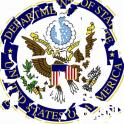Hillary Should Dare to Break State in Order to Save It
Senator Hillary Clinton, the Secretary of State designate of the incoming Obama administration has been given the most prestigious post in the Cabinet by her former presidential rival but also one of the toughest jobs in the U.S. government. The diplomatic challenges facing the United States are numerous, daunting and dangerous even as we are embroiled in a war against a global insurgency composed of radical Islamist terrorists and their local tribal, religious and governmental sympathizers. America’s diplomatic “brand” is sorely in need of rebuilding and our oldest security pillar, NATO, is failing in Afghanistan. There are herculean tasks awaiting Senator  Clinton.
Clinton.
However prepared or determined Hillary Clinton might be, the U.S. Department of State is not up to the job.
I say this not to bash foreign service officers. The average career diplomat is no more responsible for bad bureaucratic behavior in Foggy Bottom than a U.S. Army major in Iraq should be blamed for cost overruns for the Future Combat System. The problems of the State Department are systemic and there’s more than enough blame to go around. When State has reached the juncture where it is crippled in carrying out it’s core mission of diplomacy because it’s people lack language fluency, seldom leave massive fortress embassies and labor under a byzantine and dysfunctional personnel system marred by favortism and seniority, it’s time to go back to the drawing board. The window of opportunity is now.
Secretary of Defense Robert Gates recently told a brutal truth about American foreign policy:
“My message is that if we are to meet the myriad challenges around the world in the coming decades, this country must strengthen other important elements of national power both institutionally and financially, and create the capability to integrate and apply all of the elements of national power to problems and challenges abroad. In short, based on my experience serving seven presidents, as a former Director of CIA and now as Secretary of Defense, I am here to make the case for strengthening our capacity to use “soft” power and for better integrating it with “hard” power
One of the most important lessons of the wars in Iraq and Afghanistan is that military success is not sufficient to win: economic development, institution-building and the rule of law, promoting internal reconciliation, good governance, providing basic services to the people, training and equipping indigenous military and police forces, strategic communications, and more – these, along with security, are essential ingredients for long-term success. Accomplishing all of these tasks will be necessary to meet the diverse challenges I have described.
….What is not as well-known, and arguably even more shortsighted, was the gutting of America’s ability to engage, assist, and communicate with other parts of the world – the “soft power,” which had been so important throughout the Cold War. The State Department froze the hiring of new Foreign Service officers for a period of time. The United States Agency for International Development saw deep staff cuts – its permanent staff dropping from a high of 15,000 during Vietnam to about 3,000 in the 1990s. And the U.S. Information Agency was abolished as an independent entity, split into pieces, and many of its capabilities folded into a small corner of the State Department.
….Funding for non-military foreign-affairs programs has increased since 2001, but it remains disproportionately small relative to what we spend on the military and to the importance of such capabilities. Consider that this year’s budget for the Department of Defense – not counting operations in Iraq and Afghanistan – is nearly half a trillion dollars. The total foreign affairs budget request for the State Department is $36 billion – less than what the Pentagon spends on health care alone. Secretary Rice has asked for a budget increase for the State Department and an expansion of the Foreign Service. The need is real. Despite new hires, there are only about 6,600 professional Foreign Service officers – less than the manning for one aircraft carrier strike group. And personnel challenges loom on the horizon. By one estimate, 30 percent of USAID’s Foreign Service officers are eligible for retirement this year – valuable experience that cannot be contracted out.”
There many things wrong with the State Department as an institution and with the frankly insular and anachronistic cultural worldview that it tends to inculcate but starving State of operational funds and personnel – the historic reflex of the U.S. Congress – is not the road improvement. While money for “more of the same” is not an acceptable answer, demanding that diplomatic miracles be performed by the seat of the pants on a shoestring budget is a position worthy of a village idiot.
Page 1 of 4 | Next page
